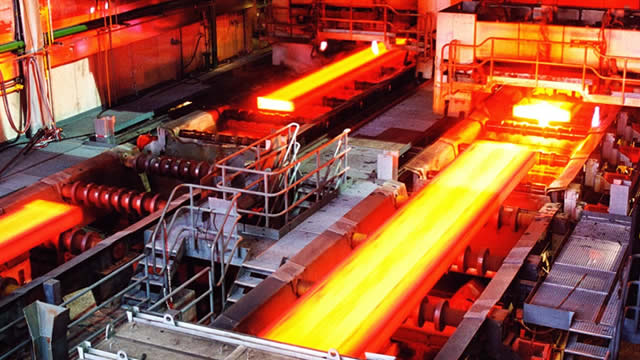Trump’s Auto Import Tariffs: A Game-Changer in the Metals Market
The global metals market is bracing itself for turbulent times as President Donald Trump’s fresh round of 25% auto import tariffs takes effect. This bold move, aimed at protecting American industries and jobs, is expected to bring near-term headwinds for key players in steel, aluminum, and copper.
Impact on Steel Industry
Steel is one of the most directly affected industries by the tariffs. According to JPMorgan analyst Bill Peterson, the tariffs could lead to a surge in domestic steel prices, making imported steel less competitive. This price increase could force some steel consumers to reconsider their sourcing strategies, potentially leading to a shift towards domestic production. However, it may also lead to increased costs for automakers and other industries that rely heavily on steel.
Impact on Aluminum Industry
Aluminum is another metal industry that could face significant challenges due to the tariffs. The United States is a major importer of aluminum, and the tariffs could lead to a rise in domestic aluminum prices. This price increase could make it more expensive for automakers and other industries to use aluminum in their products, potentially leading to a shift towards other materials. However, it could also provide a boost to domestic aluminum producers.
Impact on Copper Industry
While copper is not directly impacted by the auto import tariffs, it could still be affected indirectly. The tariffs could lead to increased costs for automakers and other industries, potentially leading them to reduce their usage of copper or seek out cheaper alternatives. Additionally, the tariffs could lead to a slowdown in global economic growth, which could negatively impact the demand for copper.
Personal Impact
As a consumer, you may see an increase in the price of vehicles and other products made with steel, aluminum, or copper. This could lead to higher costs for car purchases, home renovations, and other projects that rely on these metals. Additionally, you may see an increase in the price of certain consumer goods, such as electronics or appliances, if their manufacturers are forced to pass on their increased costs.
Global Impact
The tariffs could also have significant global implications. Other countries may retaliate with their own tariffs on American goods, potentially leading to a trade war. This could negatively impact global economic growth and lead to increased uncertainty in global markets. Additionally, the tariffs could lead to increased costs for global industries that rely on imported metals, potentially leading to reduced profits or even bankruptcies.
Conclusion
President Trump’s auto import tariffs are shaking up the metals market, with potential near-term headwinds for key players in steel, aluminum, and copper. While the tariffs could provide a boost to domestic producers, they could also lead to increased costs for consumers and global industries. Additionally, they could lead to a trade war and negatively impact global economic growth. Only time will tell how this situation unfolds, but one thing is certain: the metals market is in for a wild ride.
- Steel prices could surge, making imported steel less competitive
- Automakers and other industries may face increased costs
- Domestic steel and aluminum producers could see a boost
- Retaliatory tariffs could lead to a trade war
- Global economic growth could be negatively impacted





